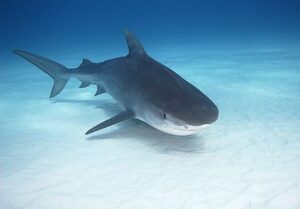One question I’m always asked is that ” Are there sharks in the Great Lakes? ” This question continues coming up, and it has piqued our interest… So, once and for all, we’ll see if a shark can get to the Great Lakes and even survive in freshwater.
If you’ve never heard of the Great Lakes, here are some fascinating facts:
The Great Lakes are a chain of five lakes that run between the United States and Canada and are among the world’s largest freshwater bodies of water. They resemble large inland seas, in reality.
Sharks In The Great Lakes

On your next beach vacation, you’re unlikely to notice any fins sticking out of the water. So, why do so many people ask if the Great Lakes have sharks?
You might find out by doing some research that some sharks can live in freshwater.
The Bull Shark, for example, has a remarkable ability to adapt to freshwater conditions and thrive. The absence of salt water would cause a dilution of salt in the body of most sharks, causing their cells to rupture and the shark to die. Bull Sharks, on the other hand, can recycle salt in their kidneys, keeping salt levels at vital levels for survival.
The Bull Shark, on the other hand, would not be able to survive in the Great Lakes watershed!
The Great Lakes’ water temperature is far too frigid for most sharks (including the Bull Shark). Even if it survived the summer, our icy winters would turn it into a “sharksicle” in no time. It may even succumb to frostbite. Get it? Frostbite.
Anyways… Furthermore, there are other difficulties that these large fish would have to overcome in order to reach the Great Lakes.
A shark coming up the Mississippi River from the Gulf of Mexico would have to pass past Chicago’s electric barrier, which is meant to repel unwanted species and keep them away from the Great Lakes, as well as the Illinois River’s numerous locks and dams.
A shark would have to pass past the dams that break up the St. Lawrence Seaway if it came in from the Atlantic Ocean through the St. Lawrence River. Not to mention the thundering Niagara Falls, which it would have to overcome and survive…
Table of Contents
Are There Sharks In The Great Lakes ?
The simple answer is no. There have been no confirmed sightings of sharks in the Great Lakes. Only bull sharks are capable of surviving in fresh water, but, there is a scarcity of appropriate food in the Great Lakes to sustain shark life.
Are There Sharks in Lake Superior?

The largest and northernmost of the Great Lakes is Lake Superior. It is the world’s largest freshwater lake in terms of surface area.
It spans from Ontario on the north shore all the way to Minnesota, Wisconsin, and Michigan on the south. The water is a cool 40 degrees Fahrenheit on average. This fact alone can rule out the possibility of any shark surviving in these waters, in simple words no.
Are There Sharks in Lake Michigan?

The shorelines of Lake Michigan run parallel to the cities of Chicago and Milwaukee, as well as the states of Wisconsin, Illinois, Indiana, and Michigan.
It is the world’s largest lake in terms of surface area. What were the chances of there being a shark roaming in these waters?
To begin, an electrical barrier was erected in the Chicago River, where it flows into Lake Michigan, in 2002. This was constructed as a deterrence to invasive species like Asian carp. This impenetrable barrier would also serve as a deterrent for sharks.
Sharks also require water temperatures of at least 70 degrees to survive. Because the temperature of Lake Michigan’s waters only reaches that level a few times a year, the habitat isn’t ideal for sharks.
I came across an article quoting Phillip Willink, a senior fish biologist at Chicago’s renowned and well-respected Shedd Aquarium, who claims that all shark sightings in Lake Michigan are fake.
I was curious to learn more about individual shark sightings or encounters that have occurred in or near Lake Michigan.
15 Best Beaches In Lake Michigan
Are There Sharks in Lake Ontario?

Ontario (including the city of Toronto) and the state of New York share a boundary with Lake Ontario. Lake Ontario, the last of the Great Lakes, is connected to the Atlantic Ocean by the Saint Lawrence River. The St. Lawrence lock system would act as a man-made barrier against sharks attempting to cross the river and reach the Great Lakes.
The usage of a full-size shark model in a 2014 alleged footage of a bull shark in Lake Ontario was proved to be a fake. This was done to draw attention to the Shark Week programming on the Discovery Channel!
Are There Sharks in Lake Erie?

The southernmost, shallowest, and warmest of the Great Lakes is Lake Erie. It shares boundaries with Ontario, Michigan, Ohio, Pennsylvania, and New York. The major lakefront cities are Cleveland and Buffalo.
There are no scientifically recorded shark sightings in this area. An eco-terrorist organisation secretly introduces six adult bull sharks into Lake Erie in the 2021 book Sharks in Lake Erie by area resident H. John Hildebrandt. Sharks in these seas, it appears, are still a major topic of discussion.
Are There Sharks in Lake Huron?

The Straits of Mackinac connect Lake Huron to Lake Michigan at its most easterly point. It has a border with the Canadian province of Ontario and the state of Michigan in the United States. Although there have been tales of dead sharks washing up on the beaches of Lake Huron, there is no way of knowing if they arrived on their own or were left as a joke.
Sharks Living Nature
- Sharks in Saltwater vs. Freshwater

To begin, I discovered that sharks are intended to live in saltwater by nature. They just cannot survive without salt to filter into their bodies.
The bull shark is one notable exception. This shark species has the ability to recycle salts through its kidneys, allowing it to live in freshwater. As a result, bull sharks are the only sharks that might potentially dwell in the Great Lakes.
- Water Temperature

The majority of sharks dislike living in cold water and prefer to avoid drastic fluctuations in water temperature. Bull sharks are the only shark species that can survive in freshwater, and they would only do so during the summer when the water is warmer.
- Distance

Sharks can swim from the ocean to a lake, which is not an impossible feat. Sharks have been discovered thousands of miles up the Amazon River and as far as Illinois, 1,700 miles from the Gulf of Mexico, on the Mississippi River.
The good news is that sharks are unlikely to traverse the eastern route from the Atlantic Ocean to the Great Lakes because of the frigid water near the entrance of the St. Lawrence River.
The Possible Way Of Bull Shark Getting Into The Great Lakes

The ship ballast water notion is an intriguing possibility for how a bull shark could get into Great Lakes waters. When container ships have no cargo or inadequate freight in their holds, ballast water is added to assist the ship balance properly in the water.
In a saltwater port, the shark could be drawn in by the ballast water. It would subsequently eat other fish housed in a similar manner as the ship made its way to its Great Lakes port. The ballast water, as well as the hitchhiking shark, would be released there.
Final Thought
• To begin with, only the bull shark, out of all shark species, is physically capable of surviving in freshwater. Even if one made it to the Lakes, the water temperatures in some of the Lakes would only be warm enough for it to survive in the summer.
• Next, a shark’s physical journey from a saltwater source to the Great Lakes is formidable, but not impossible. Most routes also have impediments such as river lock systems, which would make it extremely difficult for a shark to pass through.
• Other species were captured for the shark to feed on during the long journey, according to the ship ballast water theory. It would also rely on the time of year the ship arrived in order for the shark to be able to survive in warm enough water temperatures.
• A bull shark surviving for brief periods in several of the Great Lakes in the summer appears exceedingly implausible, but not altogether impossible.
• Residents of the United States and Canada should rest easy knowing that they will not have to share their favourite swimming and boating spots with these possible tourists!
Comments